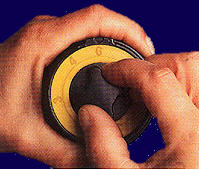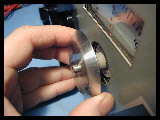
Copyright 2002, 2004 by Cliff PickoverIf you liked this page, visit Cliff Pickover's main home page for more content.
"The Dilemma of the Dials" is a trademarked term.
| You have the opportunity to determine the beauty level and intelligence level of your child, before the child is born, simply by turning two dials from 1 to 10, 10 being high. "5" is average. To what number would you set your dials? |
I would probably choose not to know and not to touch them. I've mentioned before that I have brother with Down's Syndrome. He would easily fall below a five on both counts, yet if there were a knob that showed the value of what his life contributes to others, it would be much higher.
[Clarke says, excellent idea -- an ambition dial. Other ideas: health dial (I assume we'd all put that on 10.) Happiness dial (But what if the child was in bliss just staring at a red dot on the wall 18 hours a day?) Religiosity dial? Kindness dial? What dials would you add, and which would you turn?
Would too much beauty cause the child not to pursue a highly technical field or achieve in certain areas? I know this may sound prejudiced, but scientific papers seem to indicate that extremely beautiful people perhaps appear slightly less likely to pursue advanced education (studying a random sampling of people.) Compare the beauty level of the Public Relations or Communications Department of companies versus the Unix hackers or quantum physicists... ]
I thought about this later after my original post. The thing about an
abition dial is that there is no guarantee that abition will be used for
good. Caesar, Napolean, Stalin, Genghis Kahn, they all had their abition
dials set pretty high but in their case you wouldn't necessarily say that
was a good thing. You would hope that people who crank up that abition
dial would also want to crank up the kindness dial with it or at least
some sort of morality dial as well. This is what makes Quinn's proposal
more interesting. You can add all the dials you want, but to make the problem
interesting you need to cap the ability to turn the dials towards what
are generally considired the positive direction. Another question to ask
is how many of the traits could be reasonably manipulated at birth and
how many of them are dependent upon your upbringing? Another thing to keep
in mind is that people who play role playing games make decisions like
these all the time. The only difference is your talking about who you would
want for your child instead of who you want to pretend your playing in
a game.
> Would too much beauty cause the child not to pursue > a highly technical field or achieve in certain > areas? I know this may sound prejudiced, but > scientific papers seem to indicate that extremely > beautiful people appear not to pursue advanced > education (studying a random sampling of people.) > Compare the beauty level of the Public Relations or > Communications Department of companies versus the > Unix hackers or quantum physicists...Again, a good point. You don't typically see NBA players with an abundently high IQ. Even if you use a point balance system like Quinn's, it would seem that if you have multiple dials you should have some sort of built in penalties for turning a knob too high. For example, you could double the cost of turning a knob higher than seven or maybe turning one knob past eight automtically turns another knob down by one. (Again though, some role playing systems do this.) It would seem that as you make the dilemma more and more interesting, you probably also have to start making it more complex. For a general problem you might give to the public in your book, you may not want push to the complexity so high that you lose your audience.
On the flip side -- nothing is ever as easy as turning a couple of dials: in reality, I'll have to work extremely hard to save enough money to get my kids into Harvard (for instance). And even if there were some kind of genetic engineering magic that could make my kids smart and pretty -- Greg Bear wrote a short story called "Sisters" (I think) about a future where the majority of parents did opt for engineered enhancements to their children -- only to find out when they reached their teens that there were some unforeseen 'bugs' in the process. When I read originally read the story, I was single and I thought it was an awful turn of events -- as a father, the notion scares the living heebiejeebies out of me.
Let's consider another variation, too, one that imposes far greater implications in the choice: you have the dial that you turn from 0 to 100 to determine the ratio of intelligence to good health. The higher you turn the dial, the greater the intelligence of the newborn, but the less healthy the child will be; turning to 100 would produce a genius with an extremely short lifespan, dying in infancy. Now how do you set the dial? And again, would you set it different for a boy than for a girl?
 Quinn says: It would only be a dilemma if there
were two equal options, and you had to select. Sometime more like this:
"Suppose you have a choice, before your child is born, to allocate 100
fitness points to either of beauty or intelligence, and this number represents
the child's percentile in that area. How would you allocate? 50/50? 90/10
for beauty? 75/25 for intelligence?" That would make the decision a bit
of a problem.
Quinn says: It would only be a dilemma if there
were two equal options, and you had to select. Sometime more like this:
"Suppose you have a choice, before your child is born, to allocate 100
fitness points to either of beauty or intelligence, and this number represents
the child's percentile in that area. How would you allocate? 50/50? 90/10
for beauty? 75/25 for intelligence?" That would make the decision a bit
of a problem.
[Cliff says, This is an excellent variation. I'm assuming most of us would dial up the intelligence at the expense of beauty -- especially given plastic surgery options! Perhaps I'll put a sampling of your responses to this Dilemma at my web page. ]
Is it just my own limited perception, or has desiring an advantage over others not added to the sum of human happiness in the tens of thousands of years that it has been tried?
Someone who is gaze-worthy (by the way, I didn't know Christie Brinkley was a contortionist!*) due to their symmetric proportions, just like there is something about a Fermat's Spiral or certain fractals that you can't take your eyes away from, if these instances of symmetry remind me what I am really supposed to be ``up to'' then that, to me, is a meaningful reason for being. (I like Cliff's website because it is a wonderful Reminder Central!) I like to think of those instances of symmetry as glimpses of a perfectly ordered universe which underlies and informs my human existence. I look at the laugh-crease in my boyfriend's left cheek (in his perfectly asymmetrical face) and at my 9-year old son's chipped front tooth, and I see a perfectly ordered universe there, too.
What if there is something to that: when we can see an innate perfection no matter where we look, then we have accomplished something worth all the trouble. Some things have a better disguise than others, which makes this game as challenging as we want it to be. The coolest thing is that everyone is on fair ground to play it right now, regardless of where we are dialed up on the beauty & brains scale.
 You can discuss this topic futher here.
You can discuss this topic futher here.